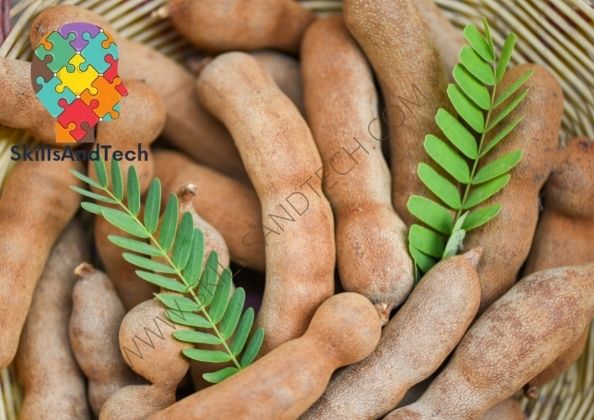
Tamarind Paste Making Business Cost, Investment, Profit, Requirements | SkillsAndTech
Over the past years, the tamarind paste making business in India is gaining culinary business enthusiasts’ attention due to the burgeoning demand for tamarind extract in households and the food processing market. In recent years, the demand for tamarind paste has touched heights due to the fact that using tamarind paste is not an unhandy task and can be used easily for multiple purposes.
The wide range of culinary uses of tamarind paste encompasses a flavouring agent for chutneys and curries. In addition to this, it is used in the traditional sharbat syrup drink. In India, the tamarind sweet chutney portrays the role of a perfect companion for several snacks. Tamarind pulp is an edible taste enhancer, and folks prefer to use it in the preparation of various types of food items. Due to its sour taste, it is utilized as a pickling agent.
The perishable nature of tamarind pulp pushes the folks to opt for packaged tamarind paste. People prefer to use the paste regularly to meet their daily cooking needs and eliminate the wastage of tamarind pulp. The massive demand for packaged tamarind paste is not only restricted to metro cities, but it has reached the villages and small cities and winning hearts everywhere.
The tamarind pulp consists of 20% moisture, 6% fibre, as well as 67% carbohydrates. When it comes to garnishing the snacks and enhancing the quality of snacks, tamarind paste is unmatchable. The tamarind paste making business in India is a business of all seasons, and its demand will never witness a downfall due to its multiple uses and taste enriching capability.
Table of Contents
How to Kick-Start Tamarind Paste Making Business in India?
In order to commence tamarind paste making business in India, a small-scale business enthusiast must follow the stepwise guidelines depicted below-
Market Potential
Ascertaining the particular market for your specific product or item is primary step to consider before commencing any form of business. Tamarind paste is available in readymade form in the Indian market and is used in cooking.
Besides the areas shown in the above-depicted image, other potential areas include food delivery options and online marketplace. All early-age startups or determined business enthusiasts should define their target customer on a priority basis as it would be helpful for them in setting the future roadmap. In countries like Malaysia, UAE, USA, and other countries, tamarind paste has a great export value.
Business Plan For Tamarind Paste Making Business
After analyzing and gaining enough knowledge related to market potential, you must come up with a logical and reasonable business plan for the tamarind paste making business. Initiating a young business comes with headaches. One essential step in gearing up for the challenges your emerging business is likely to face is composing a solid business plan.
Weaving a business plan would help you understand more clearly what steps you must follow to reach your goals. A business plan is a comprehensive guide that would contain all the information related to your business moves. Be it financial plans, technical goals, investment domain, marketing strategies or any other aspect; you will be keeping every single thing under the roof of your business plan.
Investment Required
- Starting a tamarind paste making business on a small-scale doesn’t demand huge cash investment at all.
- Nevertheless, the entire amount of cash you require depends on the production output quantity.
- Besides this, you must check whether any Govt. subsidy is available for this form of business or not.
- Generally, banks are known for granting the entire project finance.
- In that case, banks will demand either collateral security or the owner’s contribution.
- You may think of availing cash credit in the form of a working capital cost if in case you have the capital for fixed savings.
- In order to commence tamarind paste making business in India, you may need a minimum investment somewhere between Rs. 40,000 and Rs. 50,000.
See Also:
Paneer Making Business In India
- By making such a low investment of capital, you will be able to mint a great amount of profit and eventually, you would find the investment and profit in return worthwhile.
Area Required for Tamarind Paste Making Business Unit
- Establishing a business unit is a possibility in a covered area of around 1000 square feet.
- Space should have a consistent water supply as well as better electricity connection as the two core elements.
- Additionally, you would require a wide entrance for two purposes- loading and unloading.
- Setting up the business unit in an industrial zone would be beneficial for your business in the long run.
- After opting for space, you must gear up for a floor plan as well as a wearing plan.
- Moreover, you should ascertain distinct spaces for the storage, production, packaging, testing lab as well as for carrying out other official tasks.
- The company engrossed in machinery supply may help you regarding the same.
Requirement of Manpower
In order to run a small scale unit, you must manage to have six employees. Nevertheless, the number of workers is entirely based on the size of the unit as well as the quantity of production output.
A basic requirement list is mentioned below-
1- Administrative Staff- 1
2- Production Manager cum Chemist- 1
3- Semi-skilled Worker- 2
4- Skilled Worker- 2
Tamarind Paste Making Business: Raw Materials Required
Raw tamarind is one of the essential components and a major requirement for commencing tamarind paste making business. In addition to this, you would need Class II preservatives. Glass or plastic bottles would be effectively used for packaging purpose. Besides this, you should have a solidified cardboard outer cartoon as well as straps to meet the requirement of bulk packing. Eventually, you must arrange printed labels to inform your customers about the product via a descriptive note on the product.
Tamarind Paste Making Machine
On a broad level, there are two ways to set up the unit. The first one is known as the fully-automatic, whereas the second one is known as the semi-automatic. For entrepreneurs who are just a beginner and whose business is in initial days, the semi-automatic unit is perfect for them.
Major machinery are mentioned below-
- Stainless steel pulp extractor
- Cup washing and dry machine
- Baby boiler and Accessories
- Stainless steel working tables
- Stirrer, motor, and reduction gears for the kettle
- Stainless steel steam jacketed kettle
- Lab Equipment
Tamarind Paste Making Process in Brief
- Firstly, you would have to de-seed the raw tamarind.
- After that, you need to submerge the tamarind in small quantities of water in the kettle.
- Thereafter, you need to heat the mass in a gentle manner till the pulp turn out to be soft.
- Stir the mass before removing it from the kettle.
- Then, you would have to extract the pulp with the support of an extractor.
- The pulp reaped is once again immersed into the kettle, where it would get concentrated to one-third of its entire volume.
- Around 400 grams of the paste can be obtained from 1 kg of tamarind.
- After that, entail the preservatives and go ahead for packing the product containers of 200 grams capacity & seal.
- Now, you might have become familiar with the tamarind paste making process.
License
See Also:
Corn Flakes Manufacturing Business
Tea Leaf Business Chai Patti Business
To establish a business, attaining certain registrations and licenses is a compulsion. Different kinds of business demand different licenses and registrations.
To establish a this manufacturing business, you must obtain specific licenses is a must.
Registration of Firm:
You may start the small to medium Business either a Proprietorship or Partnership Firm.
If you are starting this Business as One Person Company, then you have to register your firm as a proprietorship.
For Partnership operation, you have to register as a limited liability partnership (LLP) or Pvt. Ltd. Company with
Registrar of Companies (ROC).
GST Registration:
it is mandatory to get the GST number to run the business; you need to apply for the GST registration.
Trade License:
obtain trade license from local authorities
MSME/SSI Registration:
this MSME/SSI Registration will help you to get schemes and facility for the business offers by the state government
BIS certification:
BIS has mentioned the specific quality standard for Business. ISI specification for the
Safety and Standard Authority of India (FSSAI):
This business is categories under food processing business; therefore, you must have to take the FSSAI license.
Trade Mark:
you can secure your brand with trademark registration
IEC code:
IEC code is essential for the export of the product
Employees
state insurance which is an insurance scheme for workers.
ESI Registration:
Employees provident fund is compulsory for the business where more than 20 employees are working.
To comply with the above processes and registration, one might need any legal expert who would help in absolute legal compliance to meet industrial standards.
Marketing Strategies for Tamarind Paste Making Business
Ascertaining marketing strategies concerning which road to take for the betterment of your business is crucial.
A marketing strategy revolves around two things-
- Attracting potential customers and making them familiar with your brand
- Imparting knowledge about the tamarind paste features to the customers and let them learn about the taste and hygiene that you maintain
Most importantly, you can give your nod to advertisements using banners, reviews by food specialists and advertisements in local magazines. Also, you need to establish a well-penetrated channel of distribution. Many giant e-commerce companies, as well as supermarkets, are probable options for domestic selling. Along with the domestic market, you can increase your reach to the foreign market as well. Social media platforms such as Twitter, Facebook, Instagram and various other platforms are available through which you can elevate your business on a global level.
Quality Control- Sets the Stage for Success of the Business Unit
- Quality control plays a significant part in the overall progress and accomplishments of the unit. You need to produce the paste as per the market standards prescribed by the FPO.
- An FPO license is compulsory.
- Moreover, the tamarind paste should be completely free from fermented odour on production or storage.
- In addition to this, the product should not be responsible for causing any fungal or bacterial effect.
- You must mention the expiry date on the labels.
- Tamarind paste making business unit would lead to the production of other products also.
- A multiple product processing units is considered better due to its reputation of yielding better profitability and revenue return as well.
Health Benefits of Tamarind
Imli or tamarind is a deliciously tangy comfort food that Indians enjoy having in different forms. Not only taste, but this food item is also beneficial for the health.
Digestion
See Also:
Ceramic Glazed Tiles Business In India
Sunflower Oil Business In India
Fruit Jam Making Business In India
Imli is used in Ayurvedic medicines and is known for curing digestion-based health issues. It supports easy bowel movements as it is rich in fibre.
Weight Loss
Hydroxy Citric Acid present in the tamarind restricts an enzyme present in the body from storing fat. Many studies have shown that tamarind is effective in reducing weight.
Heart Health
As tamarind is capable of lowering down blood pressure as well as blood cholesterol level, it is perfect for maintaining the health of your heart.
Rich in Significant Nutrients
It is rich in a number of vital nutrients such as iron, phosphorus, calcium, copper, vitamin C, and more nutrients.
Uplift Nerve Function
Tamarind entails the B vitamin thiamine that ensures proper functioning of nerves and leads to muscle development.
Conclusion
Tamarind paste making business is a golden opportunity for those business enthusiasts who are aiming to commence any small-scale business. The prized condiment known as Imli or Tamarind is a rich source of minerals & anti-oxidants. The increased demand for this foodstuff has opened the windows of possibilities for food business aficionados.






4 Comments
Pingback:
Pingback:
Pingback:
Pingback: